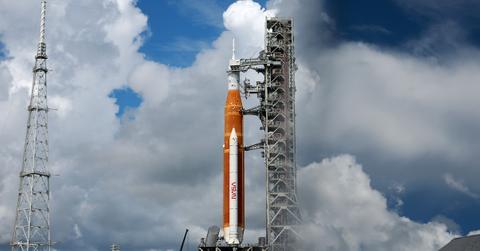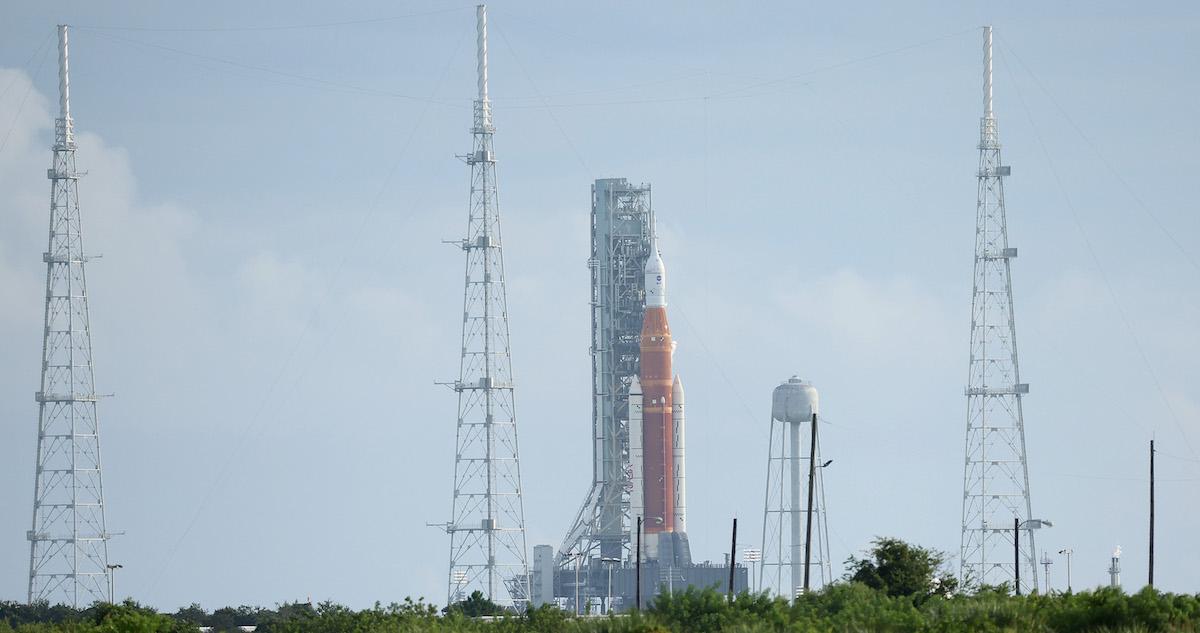Why Did NASA Stop the Artemis I Launch During This Morning's Launch Window?
Published Aug. 29 2022, 11:20 a.m. ET

NASA’s Artemis I rocket sits on launch pad 39-B at Kennedy Space Center on Aug. 25, 2022 in Cape Canaveral, Fla.
The people who woke up early to check out the NASA Artemis I launch this morning will be spending the rest of the day feeling a bit disappointed.
During the launch window on Aug. 29, things were unexpectedly halted — but why? Here’s what we know so far.
Why was NASA’s Artemis I mission launch halted just before liftoff?
NASA’s Artemis I was scheduled to launch early this morning, Aug. 29, on an unmanned flight around the moon. But early in the launch window, the launch director canceled the launch attempt.
“The launch director halted today’s Artemis I launch attempt at approximately 8:34 a.m. EDT,” NASA said in a statement published just minutes later, at 8:50 a.m. ET.

NASA’s Artemis I rocket sits on launch pad 39-B at Kennedy Space Center on Aug. 29, 2022 in Cape Canaveral, Fla.
“The Space Launch System rocket and Orion spacecraft remain in a safe and stable configuration,” the statement continued. “Launch controllers were continuing to evaluate why a bleed test to get the RS-25 engines on the bottom of the core stage to the proper temperature range for liftoff was not successful, and ran out of time in the two-hour launch window. Engineers are continuing to gather additional data.”
Before the launch director made the call, NASA kept interested parties updated on concerns throughout the morning. At 6:23 a.m. ET, NASA shared that engineers were trying to fix an issue with conditioning one of the engines on the bottom of the core stage, as well as “a crack in the thermal protection system material on one of the flanges on the core stage.”
(Flanges, not to be confused with phalanges, are actual aircraft components — they are connection joints that attach tanks to the spacecraft’s intertank.)

People wait for the Artemis I rocket to be launched from the Kennedy Space Center on Aug. 29, 2022 in Cape Canaveral as seen from the A. Max Brewer Bridge in Titusville, Fla.
Is NASA rescheduling the Artemis I launch?
Fortunately, NASA is planning to try to launch the rocket again soon.
According to ABC Action News, the next launch window opens this Friday, Sept. 2. at 12:48 p.m. ET — so fans are hoping NASA will aim to try again then. A launch window refers to the period of time in which a certain spacecraft needs to be launched, which can be determined based on a variety of factors, as per the European Space Agency.
At 8:44 this morning, just minutes after canceling the launch NASA tweeted that it “will keep you posted on the timing of the next launch attempt.” There is also a news briefing planned for later in the day today, Aug. 29, in which NASA officials will hopefully let fans know when they can expect the Artemis I to launch.
(UPDATE, Wednesday, Aug. 31, 2022, 9:24 a.m. ET: NASA has announced that it is planning to launch the Artemis I flight test around the moon on Saturday, Sept. 3. The launch window begins at 2:17 p.m. ET that day.)
The ultimate goal of the Artemis I rocket is to bring astronauts to Mars.
Even though the Artemis I has yet to leave the ground, many are calling it the “most powerful rocket in history,” including Vice President Kamala Harris.
NASA describes the Artemis I rocket as “the first step in the next era of human exploration.”
As part of the planned Artemis missions, for the first time in history, a woman and a person of color will land on the moon.
The mission also aims to explore the lunar surface, make new scientific discoveries, institute the “first long-term presence” moon, and ultimately, use the data gathered by the Artemis rocket to prepare to send astronauts to Mars for the very first time.
This article was updated to include information on the rocket's new launch attempt.